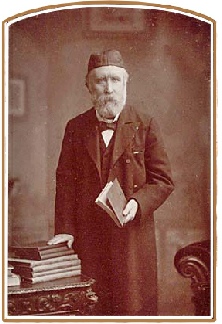John Davies Mullins
 John Davies Mullins was born in 1832 in London. At the age of twenty-
John Davies Mullins was born in 1832 in London. At the age of twenty-
The Central Lending Library and Art Gallery was opened in September 1865 on a site to the south of Edmund Street and west of the Town Hall. John Mullins was appointed as the Chief Librarian. A reference library followed a year later and within eight years there were three branch libraries and the Shakespeare Library. The Shakespeare Memorial Library had been proposed by Samuel Timmins and supported by George Dawson in 1861. The first donations were received on the tercentenary of Shakespeare’s birth in 1864 and were housed in a special room in the Central Library completed on 23rd April 1868. This library, housed in the new Library of Birmingham, now holds 60,000 volumes, archives and manuscripts allowing the continuing study of Shakespeare and Renaissance drama.
In 1879 a workman tried to unfreeze some gas pipes in the Central Library and set alight some wood shavings which lead to an inferno. The Birmingham and Aston fire brigades fought the fire heroically, but the library was virtually destroyed. Even the Mayor helped to smash glass cabinets to save 500 precious volumes in the Shakespeare Library, including the First Folio. After the fire John Mullins considered retirement but was persuaded to stay on and rebuild. A temporary library was replaced by a new building in 1882, more branches were opened, and it was a huge success. John Mullins retired due to ill health in 1898, when the library held over 233,000 volumes. He had lived in Yardley, Edgbaston and finally Handsworth with his wife Harriet. He died in 1900.
His obituary in the Birmingham Daily Post describes how he devoted a great deal of his attention to the collection relating to the history of Birmingham. It also called him a “man of culture, a graceful speaker held in high regard for his private worth”. He wrote books entitled “Free Libraries and Newsrooms” and a “Catalogue of the Reference Department of Birmingham Library”. However, his lasting legacy will be his work on cataloguing the Shakespeare Memorial Library contents in 1872. His obituary stated this work to be unique in its “completeness and comprehensiveness”.
L.W.